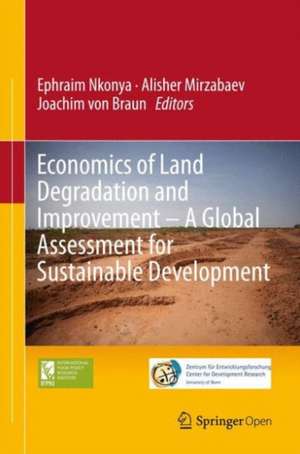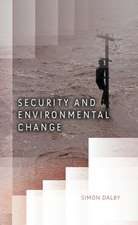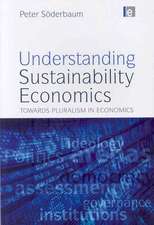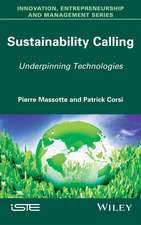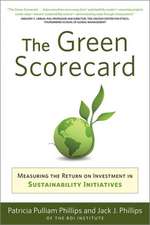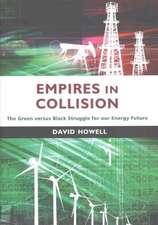Economics of Land Degradation and Improvement – A Global Assessment for Sustainable Development
Editat de Ephraim Nkonya, Alisher Mirzabaev, Joachim von Braunen Limba Engleză Hardback – 30 noi 2015
This volume deals with land degradation, which is occurring in almost all terrestrial biomes and agro-ecologies, in both low and high income countries and is stretching to about 30% of the total global land area. About three billion people reside in these degraded lands. However, the impact of land degradation is especially severe on livelihoods of the poor who heavily depend on natural resources. The annual global cost of land degradation due to land use and cover change (LUCC) and lower cropland and rangeland productivity is estimated to be about 300 billion USD. Sub-Saharan Africa (SSA) accounts for the largest share (22%) of the total global cost of land degradation. Only about 38% of the cost of land degradation due to LUCC - which accounts for 78% of the US$300 billion loss – is borne by land users and the remaining share (62%) is borne by consumers of ecosystem services off the farm.
The results in this volume indicate that reversing land degradation trends makes both economic sense, and has multiple social and environmental benefits. On average, one US dollar investment into restoration of degraded land returns five US dollars. The findings of the country case studies call for increased investments into the rehabilitation and restoration of degraded lands, including through such institutional and policy measures as strengthening community participation for sustainable land management, enhancing government effectiveness and rule of law,
improving access to markets and rural services, and securing land tenure. The assessment in this volume has been conducted at a time when there is an elevated interest in private land investments and when global efforts to achieve sustainable development objectives have intensified. In this regard, the results of this volume can contribute significantly to the ongoing policy debate and efforts to design strategies for achieving sustainable development goals and related efforts to address land degradation and halt biodiversity loss.
| Toate formatele și edițiile | Preț | Express |
|---|---|---|
| Paperback (1) | 444.85 lei 6-8 săpt. | |
| Springer International Publishing – 22 aug 2016 | 444.85 lei 6-8 săpt. | |
| Hardback (1) | 467.17 lei 3-5 săpt. | |
| Springer International Publishing – 30 noi 2015 | 467.17 lei 3-5 săpt. |
Preț: 467.17 lei
Nou
Puncte Express: 701
Preț estimativ în valută:
89.39€ • 93.34$ • 73.82£
89.39€ • 93.34$ • 73.82£
Carte disponibilă
Livrare economică 25 martie-08 aprilie
Preluare comenzi: 021 569.72.76
Specificații
ISBN-13: 9783319191676
ISBN-10: 3319191675
Pagini: 660
Ilustrații: XVIII, 686 p.
Dimensiuni: 155 x 235 x 35 mm
Greutate: 1.5 kg
Ediția:1st ed. 2016
Editura: Springer International Publishing
Colecția Springer
Locul publicării:Cham, Switzerland
ISBN-10: 3319191675
Pagini: 660
Ilustrații: XVIII, 686 p.
Dimensiuni: 155 x 235 x 35 mm
Greutate: 1.5 kg
Ediția:1st ed. 2016
Editura: Springer International Publishing
Colecția Springer
Locul publicării:Cham, Switzerland
Public țintă
ResearchCuprins
Introduction.- Part I: Concepts and Methods.- Methods.- Institutional Framework of Taking Action Against Land Degradation.- Part II: Global.- Global Extent Of Land Degradation.- Ground-Truthing of Land Degradation Mapping.- The Global Cost of Land Degradation.- Global Drivers of Land Degradation.- ELD in Global Rangelands.- Part III: Regional.- ELD in Sub-Saharan Africa.- ELD in Central Asia.- Part IV: Country Case Studies: Cost, Drivers and Action Against of Land Degradation.- Argentina.- Bhutan.- China.- Ethiopia.- India.- Kenya.- Niger.- Russia.- Senegal.- Tanzania and Malawi.-Uzbekistan.- Part V: Lessons Learnt and Implications.- What Can We Learn from the Cost of Inaction Against Land Degradation?.- What Can We Learn from the Success Stories of Addressing or Preventing Land Degradation?.- What are the Low-hanging Fruits for Addressing Land Degradation?.-What the World Needs to do to Build Momentum of Addressing Land Degradation?.
Notă biografică
Prof. Joachim von Braun
Joachim von Braun is Director of the Center for Development Research (ZEF), Bonn University, and Professor for economic and technological change. von Braun’s main research interests are in sustainable economic development, poverty reduction, food and nutrition security, resource economics, trade, science and technology policy. He is chair of the Bioeconomy Council of the Federal German Government; Vice-President of the NGO “Welthungerhilfe”, Vice Chair of the Board of Global Alliance for Improved Nutrition (GAIN), member of two German Academies, Fellow of the American Association for the Advancement of Sciences, and member of the Pontifical Academy of Sciences of the Vatican; fellow of African Academy of Science. He was Director General of the International Food Policy Research Institute (IFPRI) based in Washington, DC, U.S.A. from 2002 to 2009, and President of the International Association of Agricultural Economists (IAAE).
Dr. Alisher Mirzabaev
Dr. Alisher Mirzabaev is a senior researcher at the Center for Development Research (ZEF), University of Bonn. His current research areas include economics of land degradation, bioenergy and the wate
r-energy-food security nexus. Before joining ZEF in 2009, he was an economist with the International Center for Agricultural Research in the Dry Areas (ICARDA). He holds a PhD Degree from the University of Bonn in Germany for his thesis on the economics of climate change in Central Asia.
Dr. Ephraim M. Nkonya
Dr. Ephraim Nkonya is a senior research fellow at the International Food Policy Research Institute (IFPRI) in Washington D.C. Ephraim leads an IFPRI program on land resources for poverty reduction. He earned his masters and Ph.D. degrees in agricultural economics from Kansas State university from 1992 – 1999. He has published widely in referred journals, books and book chapters on issues related to natural resource management, poverty reduction, climate change and role of rural services on poverty reduction. He is a member of the editorial board of the African Journal of Agricultural and Resourc
e Economics. He also serves as a reviewer to a large number of referred journals.
Joachim von Braun is Director of the Center for Development Research (ZEF), Bonn University, and Professor for economic and technological change. von Braun’s main research interests are in sustainable economic development, poverty reduction, food and nutrition security, resource economics, trade, science and technology policy. He is chair of the Bioeconomy Council of the Federal German Government; Vice-President of the NGO “Welthungerhilfe”, Vice Chair of the Board of Global Alliance for Improved Nutrition (GAIN), member of two German Academies, Fellow of the American Association for the Advancement of Sciences, and member of the Pontifical Academy of Sciences of the Vatican; fellow of African Academy of Science. He was Director General of the International Food Policy Research Institute (IFPRI) based in Washington, DC, U.S.A. from 2002 to 2009, and President of the International Association of Agricultural Economists (IAAE).
Dr. Alisher Mirzabaev
Dr. Alisher Mirzabaev is a senior researcher at the Center for Development Research (ZEF), University of Bonn. His current research areas include economics of land degradation, bioenergy and the wate
r-energy-food security nexus. Before joining ZEF in 2009, he was an economist with the International Center for Agricultural Research in the Dry Areas (ICARDA). He holds a PhD Degree from the University of Bonn in Germany for his thesis on the economics of climate change in Central Asia.
Dr. Ephraim M. Nkonya
Dr. Ephraim Nkonya is a senior research fellow at the International Food Policy Research Institute (IFPRI) in Washington D.C. Ephraim leads an IFPRI program on land resources for poverty reduction. He earned his masters and Ph.D. degrees in agricultural economics from Kansas State university from 1992 – 1999. He has published widely in referred journals, books and book chapters on issues related to natural resource management, poverty reduction, climate change and role of rural services on poverty reduction. He is a member of the editorial board of the African Journal of Agricultural and Resourc
e Economics. He also serves as a reviewer to a large number of referred journals.
Textul de pe ultima copertă
This volume deals with land degradation, which is occurring in almost all terrestrial biomes and agro-ecologies, in both low and high income countries and is stretching to about 30% of the total global land area. About three billion people reside in these degraded lands. However, the impact of land degradation is especially severe on livelihoods of the poor who heavily depend on natural resources. The annual global cost of land degradation due to land use and cover change (LUCC) and lower cropland and rangeland productivity is estimated to be about 300 billion USD. Sub-Saharan Africa (SSA) accounts for the largest share (22%) of the total global cost of land degradation. Only about 38% of the cost of land degradation due to LUCC - which accounts for 78% of the US$300 billion loss – is borne by land users and the remaining share (62%) is borne by consumers of ecosystem services off the farm.
The results in this volume indicate that reversing land degradation trends makes both economic sense, and has multiple social and environmental benefits. On average, one US dollar investment into restoration of degraded land returns five US dollars. The findings of the country case studies call for increased investments into the rehabilitation and restoration of degraded lands, including through such institutional and policy measures as strengthening community
participation for sustainable land management, enhancing government effectiveness and rule of law, improving access to markets and rural services, and securing land tenure.
The assessment in this volume has been conducted at a time when there is an elevated interest in private land investments and when global efforts to achieve sustainable development objectives have intensified. In this regard, the results of this volume can contribute significantly to the ongoing policy debate and efforts to design strategies for achieving sustainable development goals and related efforts to address land degradation and halt biodiversity loss.
The results in this volume indicate that reversing land degradation trends makes both economic sense, and has multiple social and environmental benefits. On average, one US dollar investment into restoration of degraded land returns five US dollars. The findings of the country case studies call for increased investments into the rehabilitation and restoration of degraded lands, including through such institutional and policy measures as strengthening community
participation for sustainable land management, enhancing government effectiveness and rule of law, improving access to markets and rural services, and securing land tenure.
The assessment in this volume has been conducted at a time when there is an elevated interest in private land investments and when global efforts to achieve sustainable development objectives have intensified. In this regard, the results of this volume can contribute significantly to the ongoing policy debate and efforts to design strategies for achieving sustainable development goals and related efforts to address land degradation and halt biodiversity loss.
Caracteristici
Develops a conceptual framework for a more comprehensive assessment of the costs of land degradation by including the value of land ecosystem services
Provides practical analytical methods for determining the costs and drivers of land degradation at various scales
Demonstrates the application of these concepts and methods at the national level through 12 case studies
Includes supplementary material: sn.pub/extras
Provides practical analytical methods for determining the costs and drivers of land degradation at various scales
Demonstrates the application of these concepts and methods at the national level through 12 case studies
Includes supplementary material: sn.pub/extras
